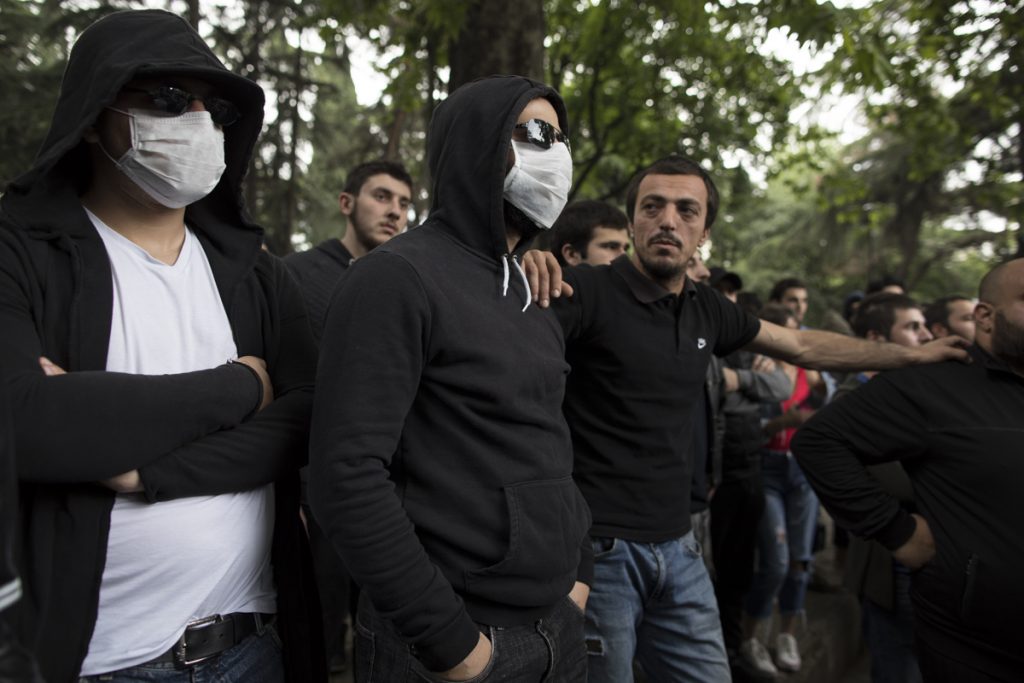Moscow aids and benefits from Nazi rise, but the roots of intolerance are home-grown
I first met Petre Ghutidze in front of Tbilisi State University in 2014 at the demonstration to defend Sakdrisi Gold Mine; he was in charge of an amateur rock concert in support of ancient gold mine preservation. Ghutidze was part of the Green Fist student group influenced by Green and Leftish ideas back then. Their paths diverged, Ghutidze says, since “cultural Marxists are infiltrating green agenda.” Last year he was in charge of the Pan-European Nationalism page on Facebook, which propagates unity among White Europeans. As one of the National Socialist leaders he was among the counter-rally that sprung up to confront the protesters against the police raid on Bassiani night-club on May 13.
Ghutidze, now proudly fascist and “head of ideology” of the Georgian National Unity movement, tells me that their group was prevented by the police from reaching the demonstration. He also makes it clear them and the more notorious the March of the Georgians group are distinct from one another: “as for Korkotashvili and the March of the Georgians, us and them are on different positions and have different views. We have no link with them.”
A new research by the Transparency International Georgia has shown that in the recent alliance of the radical nationalistic and fascist groups “there are traces of Russian meddling.” One of the prominent faces of the March of the Georgians, former MP Dimitri Lortkipanidze was appointed as the director of the Moscow-funded Primakov Georgian-Russian Public Centre.
The growing visibility of fascist groups and propaganda of radical intolerance in Georgia – as well as the polarization it causes in the society – clearly serves the Russian interests, but young radical right-wing activist’s agenda is far from being all about Russia.
Local issues nurture youth attraction to far right in the Georgian society. Failing to acknowledge that would only aggravate the situation.
A research from the Media Development Foundation, a Tbilisi-based watchdog, has shown, that in 2016-2017 “losing Georgian identity and values” represented one of the messages spread most widely by anti-Western, xenophobic media channels. These media have blamed the West for “imposing homosexuality” on Georgia. LGBTQ Georgians were portrayed as aliens, degenerate outsiders. According to the research, homophobia accounted for more than half of hate speech in public domain in 2017.
Ever since youth far-right groups started emerging in Georgia’s social networks in 2013-2014, the LGBTQ Georgians and all of their supporters became their main targets and scapegoats. Only 2015 refugee crisis in Europe made some Georgian far right groups shift their focus towards anti-immigrant discourse akin to that pedaled by Viktor Orbán – as defenders of white, Christian Europe. Unlike rather pro-Russian March of the Georgians, many young ultranationalists get their inspiration from the European far right. Their positions have acquired somewhat perversely pro-European tint, which confuses even the ultra-nationalists. For example in April 2016, Ghutidze and his fellow national-socialists organized a rally during Orbán’s visit in Tbilisi, greeting Hungarian government’s decision to attack the Central European University.
Various groups of online or offline nationalists propagate different ideas, yet one thing all have in common is aggressive rhetoric towards “the internal enemies.” Georgia’s far right activists are not just nativist, they primarily aim to “defend traditional values.” One of their preferred tactics in doing so is to tag and demonize specific “non-traditional” or “liberal” groups (and their sympathizers) as being “less Georgian.” Protesting against giving the public voice to non-heterosexual Georgians remained high on the Georgian young far right agenda.
“We got to streets to show people that feminists, LGBT-propagandists and drug-lovers cannot make revolutions in this country” – Ghutidze told me, explaining his motivation to get to the street during the weekend of Bassiani protests. He adds that “you cannot deal with [Russian] occupation, if you do not defeat the internal enemy and rot first.”

